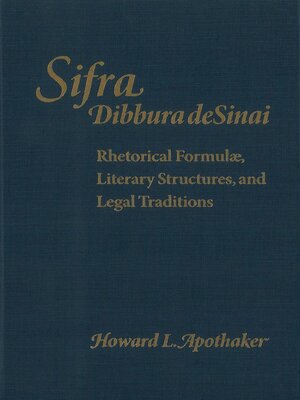Sifra, Dibbura de Sinai
ebook ∣ Rhetorical Formulae, Literary Structures, and Legal Traditions · Monographs of the Hebrew Union College
By Howard L. Apothaker

Sign up to save your library
With an OverDrive account, you can save your favorite libraries for at-a-glance information about availability. Find out more about OverDrive accounts.
Find this title in Libby, the library reading app by OverDrive.



Search for a digital library with this title
Title found at these libraries:
| Library Name | Distance |
|---|---|
| Loading... |
Sifra is the earliest extant rabbinic commentary on the book of Leviticus. On a basic level, Sifra presents and validates rabbinic law, but this was done by creating a link between a proposition, halakhic or not, and a scriptural passage. Scholars in the last few decades-including Neusner and Stemberger-have debated Sifra's relationship to Mishnah-Tosefta. Howard Apothaker demonstrates that the set of rules in Dibbura deSinai on topics shared with Mishnah-Tosefta can be understood as an independent body of law. They share a common ancestor but represent different expressions of a similar worldview and with variant purposes. The framers of Sifra sought as their main objective to validate the essentiality, or non-superfluity, of every word of Scripture. Apothaker's analysis of the exegetical and rhetorical characteristics of Sifra in Sifra, Dibbura deSinai: Rhetorical Formulae, Literary Structures, and Legal Traditions builds on his translation of and commentary on the section of Dibbura deSinai which covers Leviticus 25-27. Analysis of Sifra's highly formalized rhetoric yields insight concerning the general purpose(s) for which the framers created the work.







